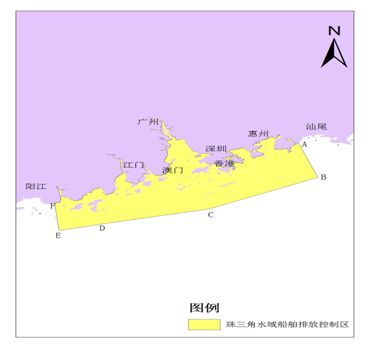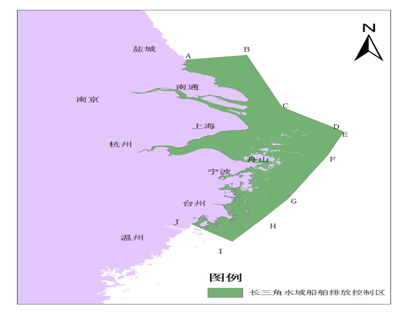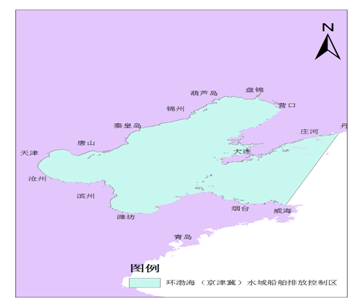1.1 The Implementation plan of Domestic Emission Control Areas (DECA) made by PRC Ministry of Transport
2nd Dec. 2015, the PRC Ministry of Transport published the Implementation Plan on Domestic Emission Control Areas in Waters of the Pearl River Delta, the Yangtze
River Delta and Bohai Rim (Beijing, Tianjin, Hebei) [Jiao Hai Fa No.177].
This Plan provides that-
As of 1st Jan. 2016, the Ports with necessary capability in DECA can implement the measure that the sulphur content of any fuel oil used on board vessels berthing at these ports shall not exceed 0.5% m/m, or other higher emission control requirements.
As of 1st Jan. 2017, the sulphur content of any fuel oil used on board vessels berthing at the core ports in DECA (excluding the first hour after arrival and the last hour before departure, similarly hereinafter) shall not exceed 0.5% m/m. According to this Plan, the core ports are as following:
Pearl River Delta: Shenzhen, Guangzhou, Zhuhai
Yangtze River Delta: Shanghai, Ningbo-Zhoushan, Suzhou, Nantong;
Bohai Rim: Tianjin, Qinhuangdao, Tangshan, Huanghua.
As of 1st Jan. 2018, the sulphur content of any fuel oil used on board vessels berthing at all ports in DECA shall not exceed 0.5% m/m.
As of 1st Jan. 2019, the sulphur content of any fuel oil used on board vessels entering waters within DECA shall not exceed 0.5% m/m.
Before 31st Dec. 2019, to assess the effect of the above measures and to ascertain whether to take the following measures:
1) the sulphur content of any fuel oil used on board vessels entering waters within DECA shall not exceed 0.1% m/m;
2) to extend the geographic scope of the DECA;
3) other further measures;
Vessels can take alternative measures, equivalent to the aforementioned control measures, inter alia, using shore power, clean energy and exhaust after-treatment.
According to this Plan, the DECA of the Pearl River Delta was ascertained as follows:
Boundaries of the sea area: the sea area within the lines connected by Points A, B, C, D, E, F, the waters of Hong Kong and Macau are not included.
A: Junction point of the mainland coastlines of Huizhou and Shanwei;
B: 12 nautical miles extending outward from Zhentouyan;
C: 12 nautical miles extending outward from Jiapeng Islands;
D: 12 nautical miles extending outward from Weijia Island;
E: 12 nautical miles extending outward from Dafanshi Island;
F: Junction point of the mainland coastlines of Jiangmen and Yangjiang;
(As shown in the following picture)

The scope of inland waters: the navigable inland waters within the administrative areas of Guangzhou, Dongguan, Huizhou, Shenzhen, Zhuhai, Zhongshan, Fomen, Jiangmen and Zhaoqing.
The DECA of the Yangtze River Delta was ascertained as follows:
Boundaries of the sea area: the sea area within the lines connected by Points A, B, C, D, E, F, G, H, I, J.
A: Junction point of the mainland coastlines of Nantong and Yancheng;
B: 12 nautical miles extending outward from Waikejiao Island;
C: 12 nautical miles extending outward from Sheshan Island;
D: 12 nautical miles extending outward from Haijiao Reef;
E: 12 nautical miles extending outward from Dongnanjiao Reef;
F: 12 nautical miles extending outward from Liangxiongdiyu Isle;
G: 12 nautical miles extending outward from Yushan Islands;
H: 12 nautical miles extending outward from Taizhou Islands;
I: 12 nautical miles extending outward from the junction point of the mainland coastlines of Taizhou and Wenzhou;
J: Junction point of the mainland coastlines of Taizhou and Wenzhou;
(As shown in the following picture)

The scope of inland waters: the navigable inland waters within the administrative areas of Nanjing, Zhenjiang, Yangzhou, Taizhou, Nantong, Changzhou, Wuxi, Suzhou, Shanghai, Jiaxing, Huzhou, Hangzhou, Shaoxing, Ningbo, Zhoushan and aizhou.
The DECA of the Bohai Rim was ascertained as follows:
Boundaries of the sea area: the sea area within the lines connected by the Junction point of the mainland coastlines of Dalian and Dandong and the Junction point of the mainland coastlines of Yantai and Weihai
(As shown in the following picture)

The scope of inland waters: the navigable inland waters within the administrative areas of Dalian, Yingkou, Panjin, Jinzhou, Huludao, Qinhuangdao, Tangshan, Tianjin, Cangzhou, Binzhou, Dongying, Weifang and Yantai.
The DECA would not apply to the military vessels, sport vessels and fishing vessels
Full text of this MOF Plan could be obtained at:
http://www.moc.gov.cn/zfxxgk/bzsdw/bhsj/201512/t20151204_1942434.html
2.2 First try of the core ports of Yangtze River Delta.
After the above Plan, then the MOF released a reply on Earlier Implementation of the Yangtze River Delta Domestic Emission Control Area by Core Ports, announcing that- Shanghai, Ningbo-Zhoushan, Suzhou and Nantong will do the first try to implement the DECA. The specific works are divided into two stages:
In the first-stage, as of 1st April 2016, the sulphur content of any fuel oil used on board vessels berthing at core ports of Yangtze River Delta shall not exceed 0.5% m/m, vessels berthing at these ports are recommended to use the fuel oil with sulphur content not exceeding 0.1% m/m and vessels entering waters within these ports are recommended to use the fuel oil with sulphur content not exceeding 0.5% m/m.
Based on the assessment of the effect of the first-stage work, the second-stage work /further control measures would be taken in due course, such as: 1) the sulphur content of any fuel oil used on board vessels entering waters within these ports shall not exceed 0.5% m/m, 2) the sulphur content of any fuel oil used on board vessels berthing at these ports shall not exceed 0.1% m/m, and 3) the sulphur content of any fuel oil used on board vessels entering waters within these ports shall not exceed 0.1% m/m.
In order to implementing the above two documents of MOF, Shanghai Municiple People’s Government, Jiangsu Province People’s Government and Zhejiang Province People’s Government respectively issued their work plans on implementing DECA in early this year, ascertaining that all the sulphur content of any fuel oil used on board vessels berthing at Shanghai Port, Ningbo-Zhoushan Port, Suzhou Port and Nantong Port shall not exceed 0.5% m/m on and after 1st April 2016. The following two month, saying April and May, will be the transitional period, within which vessel in breach of the request of DECA will be educated, warned and ordered to correct, and after which the administrative punishment will be imposed.
The Transport Departments and MSA of the above provinces also issued corresponding specific regulations for implementing the work plans, which could be accessed through below links:
Shanghai:
Zhejiang:
http://www.moc.gov.cn/st2010/zhejiang/zj_tongzhigg/tzgg_qita/201604/t20160405_2009219.html
Jiangsu:
http://www.jscd.gov.cn/art/2016/4/1/art_18938_1179541.html
According to the media reports accessible online, MSA Shanghai seized the first vessel in breach of the request of DECA on 27th April 2016. When MSA officers conduct the inspection of the Panamanian Vessel MV P *, they found the vessel did not use the low-sulphur fuel, although the conversion of low-sulphur fuel had been recorded in detail in the legal documents of the vessel. Then the Captain of this vessel made apology for their breach of Chinese laws.
19th July 2016, MSA Ningbo made the first administrative punishment on a vessel, which used fuel oil with 1.22%m/m sulpher content at the time berthing at Terminal Xindongfang of Ningbo Port, far exceeding the standard 0.5%m/m. In line with relevant provisions of PRC Atmospheric Pollution Prevention and Control Law, the vessel should pay penalty ranging from RMB 10,000 to RMB 100,000.
2.3 The Latest Development of Implementing the Low-sulphur Fuel Oil Outside the Yangtze River Delta.
Based on the provisions of Work Plan for Implementing the Measures of Controlling the Pollution of Berthing Vessels (Shen Fu Ban Han [2016] No. 125) promulgated by Shenzhen Municipal People’s Government in August this year and the aforementioned MOF’s Implementation Plan, MSA Shenzhen, together with other relevant departments of Shenzhen, issued the Announcement regarding Vessels Berthing at Shenzhen Port to Use Low-sulphur Fuel Oil.
According to this Announcement, Shenzhen Port will implement the MOF’s Plan ahead of the schedule, saying as of 1st Oct. 2016, the sulphur content of any fuel oil used on board vessels berthing at the Shenzhen Port (excluding the first hour after arrival and the last hour before departure) shall not exceed 0.5% m/m, otherwise corresponding administrative punishment would be imposed on the vessels according to the Art.106 of PRC Atmospheric Pollution Prevention and Control Law.
Pls. refer to the news report on the official website of MSA Shenzhen:
2.4 Procedures of Inspection and Punishment Measures Conducted by MSA.
As to how to conduct inspections of the fuel oil used by vessels and make the punishment to vessels in breach of the request of DECA, MSA China published the PRC MSA’S Notice for Enhancing the Supervision and Management of Vessels in DECA along with an attachment named as Guidance on the Supervision and Management of Vessels in DECA on 29th Jan. 2016.
The Notice mainly provides-
Vessels that need to convert to use the low-sulphur fuel should record the beginning and ending dates, time, location(longitude and latitude) and sulphur content of the fuel conversion and the used amount of the low-sulphur fuel, the operating persons of the conversion and other relevant information into the engine log books. And the vessels should be equipped with writing procedures regarding the fuel conversion, which should be a part of the ISM of vessels.
The fuel suppliers should made sample inspection of each lot fuel oil supplied to the vessel and reserve the inspection report for future reference. The supplier should provide vessels with fuel oil delivery and receipt documents and the samples of the fuel oil supplied. The delivery and receipt documents should be reserved for 3 years and the sample should be reserved at least for 1 year and till the fuel oil is used up.
The Notice also provided how to record and operate when vessels choose to use alternative measures with equivalent effect of using low-sulphur fuel oil, such as using shore power, clean energy and exhaust after-treatment.
As per the Guidance, MSA could inspect the documents of vessels first, such as the engine log books, the documents of delivery and receipt of fuel oil, the conversion procedure of fuel oil etc. If necessary, MSA will take simples of the fuel oil used by vessels and conduct inspection of the simple according to relevant procedure and methods provided by MARPOL convention, so as to ascertain whether vessel use the qualified fuel oil or not.
The punishment measures provided by this Guidance are as follows:
1. If the fuel oil used by the vessel does not meet the request of DECA, based on the circumstances and according to the provisions of relevant laws, regulations and international conventions, one or more of the following punishment measures could be taken by MSA:
a) Warning and education
b) Correction of the act in breach of laws;
c) Detention;
d) To impose punishment in line with Art.106 of PRC Atmospheric Pollution Prevention and Control Law; if the vessel has left the port, the local MSA could notice the MSA of next port to conduct the punishment.
2. If the fuel oil supplier did not fill in the fuel oil delivery and receipt documents with true information, or did not provide the vessel with the fuel oil delivery and receipt documents or fuel oil simples requested by relevant laws and regulations, the punishment would be imposed according to Art. 63 of the Regulation on the Prevention and Control of Vessel-induced Pollution to the Marine Environment.
3. If vessels or the fuel oil suppliers did not reserve the fuel oil delivery and receipt documents and fuel oil simples requested by relevant laws and regulations, the punishment would be imposed according to Art. 63 of the Regulation on the Prevention and Control of Vessel-induced Pollution to the Marine Environment.
The Notice and Guidance of MSA could be accessible at:
As per the MOF’s Implementation Plan, as of 1st Jan. 2017, the sulphur content of any fuel oil used on board vessels berthing at all the core ports in DECA shall not exceed 0.5% m/m, so, besides the ports (Shanghai, Ningbo-Zhoushan, Suzhou, Nantong, Shenzhen) which have already implemented the Plan, other cores ports will also implement this Plan from 1st Jan. 2017. However, till to date (3rd Jan. 2017), we have not see corresponding specific provisions made by relevant province governments or local MSA. We shall keep an eye on this regard.


